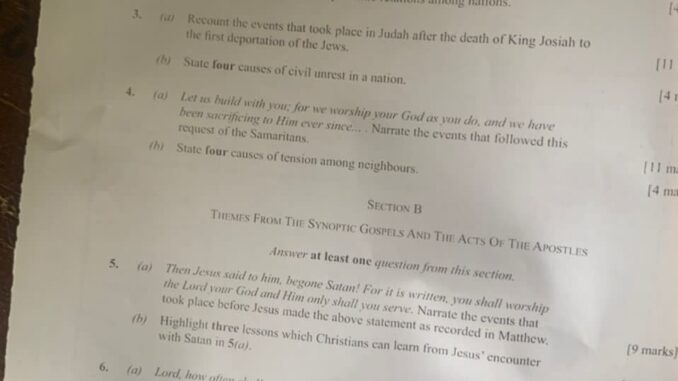
========================================
Friday, 9th June, 2023
Christian Religious Studies 2 (Essay) – 09:30am – 11:30am
Christian Religious Studies 1 (Objective) – 11:30am – 12:30pm
=======================================
CRS QUESTION;-ExamgrandComNg !!!!!


=======================================
WAEC CRS OBJ;-ExamgrandComNg
1-10: CADBDDDBDB
11-20: ACBBBCBDAD
21-30: CCBCCCCBBC
31-40: DBDADADADA
41-50: DDCCCBBDBA
COMPLETED by Examgrand
=================================
WAEC IRS OBJ;-ExamgrandComNg
1-10: BDBBDADDAD
11-20: ADDADCCCAD
21-30: DCCDBBACBB
31-40: CDCABCDBBD
41-50: BDBACDACAB
Completed!!!;-Examgrand✅✅
============================================
CRS ANSWERS;-ExamgrandComNg !!!!!
NUMBER 1
Moses, who was raised as a prince in Egypt, fled to Midian after he killed an Egyptian who was beating a Hebrew slave. In Midian, he met and helped Zipporah and her sisters water their flock. Zipporah’s father, Jethro, who was also a priest of Midian, invited Moses to stay with him and work for him.
Moses worked for Jethro for several years, during which he became close to Zipporah. One day, as Moses was taking care of Jethro’s flock, he saw a burning bush that was not consumed by the fire. He approached the bush and got a revelation from God to go and rescue the Israelites from slavery in Egypt.
Moses returned to Jethro and asked for his permission to return to Egypt. Jethro gave him his blessing and sent him off with Zipporah and their two sons. However, when they stopped for the night on their journey, an angel of the Lord sought to kill Moses.
Zipporah, knowing the customs of her people, quickly circumcised their son with a flint knife and touched Moses’ feet with the foreskin, declaring, “Surely you are a bridegroom of blood to me.” This appeased the angel and Moses was spared.
This event led to the marriage of Moses and Zipporah, who had already fallen in love with each other. They continued their journey to Egypt, where Moses confronted Pharaoh and delivered the Israelites from slavery.
(b)
i. Persecution: One of the most common reasons why people seek asylum is to avoid persecution in their home country. Persecution can take many forms, including political persecution, religious persecution, persecution based on race, ethnicity, nationality, or membership in a particular social group. People who seek asylum on the grounds of persecution fear for their safety and life in their home country and seek protection in another country where they can enjoy their basic human rights and freedoms.
ii. War, conflict, and violence: Another reason why people seek asylum is because of the war, conflict, and violence in their home country. Such people may have suffered significant losses, including the loss of family members, homes, and businesses, and may be at risk of physical harm and exposure to extreme violence. Asylum seekers from war-torn countries have often been subject to torture, forced labor, sexual abuse, and other human rights violations, which force them to flee their country to seek safety elsewhere. In such cases, the asylum seekers may be seeking temporary refuge until the conflict or violence ceases in their home country.
=======================================
(2a)
Solomon, the son of King David, ascended to the throne of Israel and desired to build a magnificent temple for the worship of God in Jerusalem. He sent a message to King Hiram of Tyre, a renowned Phoenician ruler known for his skill in construction and trade. Solomon expressed his admiration for Hiram’s expertise and requested his assistance in the construction of the temple.
King Hiram responded positively to Solomon’s request and sent his skilled craftsmen, particularly a man named Huram-Abi (also known as Hiram-Abiff), who was half-Israelite and half-Tyrean. Huram-Abi was an expert in working with bronze, and he played a crucial role in the temple’s construction.
Furthermore, King Hiram provided Solomon with the necessary materials for the temple. The account in 1 Kings 5:8-11 describes how Hiram sent cedar and cypress logs from Lebanon to Jerusalem. These logs were used for the construction of the temple’s structure and its interior decoration.
The relationship between Solomon and Hiram went beyond mere trade and construction. They established a friendly alliance and engaged in peaceful relations. They even exchanged gifts as a symbol of their friendship and cooperation. In 1 Kings 5:12, it is mentioned that Solomon gave Hiram twenty thousand cors of wheat and twenty thousand baths of pure oil each year.
The cooperation between Tyre and Israel continued throughout the construction of the temple. Skilled Tyrean workers collaborated with Israelite craftsmen and laborers under Solomon’s supervision. The temple gradually took shape and became a splendid edifice, renowned for its grandeur and magnificence.
The diplomatic relations between Tyre and Israel during Solomon’s reign were vital in facilitating the construction of the temple. Tyre’s contribution of skilled workers and building materials, coupled with the friendly alliance between the two kingdoms, ensured the successful completion of the project. The temple of Solomon stood as a testament to the cooperation between these two nations and served as a central place of worship for the Israelites for centuries to come.
(2b)
(PICK ANY TWO)
(i) Diplomatic relations provide a platform for dialogue and negotiations, enabling nations to resolve conflicts peacefully.
(ii) It facilitates economic cooperation between nations such as engaging countries in trade agreements, investment partnerships, and economic collaborations which foster economic growth, create employment opportunities, and enhance prosperity by promoting the exchange of goods, services, and knowledge.
(iii) It fosters cultural exchange and understanding among nations.
(iv) Diplomatic relations enable countries to collaborate on security and defense issues which helps address common security challenges, promoting stability and safeguarding national interests.
(v) Diplomatic relations allow nations to address global challenges collectively
=======================================
(3a.)
After the death of King Josiah, his son, Jehoahaz, was appointed king but was quickly deposed by Pharaoh Neco of Egypt. Neco then appointed Jehoiakim as king of Judah. During Jehoiakim’s reign, the Babylonians defeated the Egyptians and took control of Judah. Jehoiakim was succeeded by his son Jehoiachin, who was also deposed by the Babylonians. The Babylonians then appointed Zedekiah as king.
During Zedekiah’s reign, the Babylonians besieged Jerusalem and eventually captured it. Zedekiah and the people of Judah were taken into exile in Babylon. This marked the first deportation of the Jews. The Babylonians then destroyed the Temple in Jerusalem and razed the city.
3b.)
1. Demonstrations and protests
2. Strikes and boycotts
3. Riots and looting
4. Sabotage and vandalism
=======================================
(4)
a. When the Samaritans made this request to build with the Jews, the Jewish leaders initially welcomed them and allowed them to participate in the rebuilding of the temple. However, tensions quickly arose as the Samaritans refused to acknowledge the authority of the Jewish leaders and insisted on worshiping their own gods alongside Yahweh. The Samaritans also began to object to some of the aspects of Jewish worship and accused the Jews of trying to dominate them. Eventually, the two groups became locked in a bitter power struggle over control of the temple and the surrounding area, leading to violence and bloodshed.
(b)
-territorial disputes
-political conflicts
-religioius/cultural difference
-economic competition
=======================================
(5a)
After Jesus was baptized by John the Baptist, He was led by the Spirit into the wilderness to be tempted by the devil.
In the wilderness, Jesus fasted for forty days and nights. During this time, Satan came to Him and tempted Him three times. First, Satan tempted Jesus to turn stones into bread, appealing to His physical hunger. Jesus responded by quoting Scripture, saying, “Man shall not live by bread alone, but by every word that proceeds out of the mouth of God.”
Next, Satan took Jesus to the pinnacle of the temple and tempted Him to throw Himself down, challenging Jesus to test God’s protection. Again, Jesus quoted Scripture, saying, “You shall not put the Lord your God to the test.”
Finally, Satan took Jesus to a high mountain and showed Him all the kingdoms of the world, offering to give them to Him if Jesus would worship him. Jesus rebuked Satan, saying, “Get behind me, Satan! For it is written, ‘You shall worship the Lord your God and him only shall you serve.’
(5b)
(PICK ANY THREE)
(i) Christians can learn the importance of knowing and studying the Bible, as it equips them to recognize and overcome temptations.
(ii) Christians can learn that it is not appropriate to deliberately put ourselves in dangerous situations, expecting God to rescue us miraculously. Instead, we should exercise wisdom, discernment, and faith, trusting in God’s guidance and providence.
(iii) Christians can learn that their allegiance should be exclusively directed towards God. They should not be swayed by worldly temptations or false idols but should devote their worship and service to the one true God.
(iv) Christians should actively cultivate their relationship with God through prayer, study of the Scriptures, and reliance on the Holy Spirit, equipping themselves to resist and overcome the schemes of the enemy.
(v) Christians can learn the lesson of exercising self-control and resisting the temptation to seek quick fixes or temporary pleasures that contradict God’s will.
=======================================
(6a)
Then Peter came to Jesus and asked, “Lord, how often shall my brother sin against me, and I forgive him? Up to seven times?” Jesus answered him, “I do not say to you, up to seven times, but up to seventy times seven.”Matthew 18:21-22
In this response, Jesus emphasizes the importance of limitless forgiveness. By using the phrase “seventy times seven,” Jesus implies that forgiveness should be extended without counting or limit. It indicates a radical call to show mercy and forgiveness, even in the face of repeated offenses.
(6b) Three benefits one stands to gain in forgiving others:
ii. Emotional Healing: Forgiving others brings emotional to the forgiver. Holding onto grudges, anger, and resentment can cause stress, anxiety, and bitterness, affecting one’s well-being.
ii. Restoration of Relationships: Forgiveness has the potential to restore broken relationships. When someone forgives, it opens the door for reconciliation and the rebuilding of trust and intimacy. Forgiveness allows for the possibility of healing wounds, fostering empathy, and rebuilding a stronger and healthier relationship with the person who has been forgiven.
iii. Spiritual Growth and Freedom: Forgiveness is a deeply spiritual act that aligns with the teachings and example of Jesus. When individuals forgive, they reflect the character of God, who is merciful and forgiving.
=======================================
(7a)
The believers’ communal living was such that the Christians shared their possessions in common. Ananias and Sapphira sold their own piece of land, but brought only a part of the money to the Church. This was strictly against the spirit of communal life of the Christians. Peter asked Ananias why satan had led him to lie to the Holy Spirit, telling him that the land and the proceeds were theirs and they were free to handle them the way they wished. But by declaring publicly that they were handing over the entire proceeds, they had not lied to man but to God. When Ananias heard these words of rebuke from Peter, he fell down and died. Young men later carried away his body for burial. His wife / Sapphira came in, unaware of what had happened to her husband. Peter asked her whether they had sold the land for the amount surrendered, she affirmed it. Peter asked her why she conspired with her husband to tempt the spirit of God telling her to listen to the approaching footsteps of those who had gone to bury her husband: Immediately she heard this she fell down and died. Her body was carried away by the same young men who had earlier carried her husband for burial. Great fear came upon the Church and upon all who heard the news.
(7b)
(i)Ananias and Sapphira were misguided into thinking that they could serve both God and Mammon at the same time.
(ii)One can deceive a fellow man, but cannot deceive God who reads the heart of man.
(iii) The Church was established by God and controlled by the Holy Spirit. Members must work in accordance with guidelines set up by the Holy Spirit.
(iv) God punishes sin of disobedience and His judgment is certain. We should give with sincerity / honesty.
=======================================
(8a)
In James 1:5-6, it is advised to ask God for wisdom with faith, believing that He will provide it. The passage states, “If any of you lacks wisdom, you should ask God, who gives generously to all without finding fault, and it will be given to you. But when you ask, you must believe and not doubt.”
James encouraged believers to pray in faith, trusting that God will answer their prayers. In James 1:6, it states, “But when you ask, you must believe and not doubt, because the one who doubts is like a wave of the sea, blown and tossed by the wind.”
James emphasizes the importance of having pure motives when praying. It warns against praying selfishly or with wrong intentions, saying, “When you ask, you do not receive, because you ask with wrong motives, that you may spend what you get on your pleasures.”
James also urged Christians to confess their sins to one another and pray for each other, emphasizing the importance of seeking forgiveness and reconciliation. It states, “Therefore confess your sins to each other and pray for each other so that you may be healed. The prayer of a righteous person is powerful and effective.”
He highlighted the significance of approaching God with humility. In James 4:10, it states, “Humble yourselves before the Lord, and he will lift you up.”
James encouraged believers to be persistent in their prayers. In James 5:16, it mentions the effective prayer of Elijah, who “prayed earnestly that it would not rain, and it did not rain on the land for three and a half years.”
(8b)
(PICK ANY FOUR)
(i) Doubt or lack of belief in the power of prayer can hinder its effectiveness.
(ii) Holding grudges or harboring feelings of resentment towards others
(iii) Praying solely for personal gain or with selfish intentions
(iv) Unconfessed sins
(v) Lack of dedication
(vi) Praying for something that goes against the greater plan or purpose of GOD
(vii) Prideful or arrogant attitude
=======================================
(9a)
Peter advised elders to look after God’s flock with tender care. They should work not as being under any external constraint, but willingly; not with the desire to make material gains, but with the eagerness that comes from the heart; not with a presumptuous and domineering spirit but as examples to be copied by the flock, so that at the appropriate time, they might attain the crown of glory.
Peter advised the young ones to be in humble subjection to the leaders, for God humiliates the proud and exalts the humble. However, for both young and old, Peter recommends the humble approach. They should leave all cases of anxiety in the able hands of God. They should, in all soberness, be vigilant against the temptation of the devil who is always around to lead the spiritually weak ones to destruction in hell. Armed with patient faith, they should remember that suffering is part of their Christian calling, knowing that suffering will lead to glory in Christ who has eternal dominion.
(9b)
(i)Pride: People often behave with self-centeredness, ego, and pride.
(ii)Spiritual and Emotional Immaturity: Maturity helps a person understand that differences in perspective broaden understanding.
(iii)Change and Inflexibility: In reality, change is the norm.
=======================================
Friday, 9th June, 2023
Islamic Studies 2 (Essay) – 09:30am – 11:30am
Islamic Studies 1 (Objective) – 11:30am – 12:20pm
IRS QUESTION;-ExamgrandComNg !!!!!

=======================================
WAEC IRS ANSWERS;-ExamgrandComNg !!!!!
(1a)
Bismillah hir rahman nir raheem
(i) Qul huwal laahu ahad
(ii) Allah hus-samad
(iii) Lam yalid wa lam yoolad
(iv) Wa lam yakul-lahoo kufuwan ahad
(1b)
(i) Say, :The truth is that Allah is One.
(ii) Allah is Besought of all, needing none.
(iii) He neither begot anyone, nor was he begotten.
(iv) And there hath never been co-equal with Him anyone.
(1c)
Surah Al-Ikhlas concisely describes the concept of God in Islam. The religion of Islam presented in the Qur’an is based on the following three doctrines:
(i) Tawheed (belief in the Oneness of Allah)
(ii) Risalat (belief in the Prophets & Messengers of Allah and the teachings that they brought for humanity through Divine revelations)
(iii) Akhirat (belief in the next life after death and in the rewards or punishments in that life based on the deeds performed in this life)
=======================================
(2)
Fajr (2 Rakah)
This takes place at pre-dawn
Dhuhr (4 Rakah)
This takes place just after the sun reaches its zenith
Asr (4 Rakah)
This takes place between noon and sunset
Maghrib (3 Rakah)
This takes place just after sunset
Isha (4 Rakah)
This takes place during the night/at night-time
=======================================
(3)
(i) Abu Bakr was the first Caliph to succeed Prophet Mohammed.
(ii) Helped in the collection of various fragmented verses to make the Quran into a single book.
(iii) Helped to build the mosque of Medina and paid for the land on which it was built
(iv) Helped the prophet Mohammed to fight many jihads (Holy war)
(v) He formed a well-trained army to fight many jihads
(vi) He was a great warrior.
(vii) Taught Muslims the Hajj rites and rituals, e.t.c
=======================================
NO. 4
Bukhari’s Hadith Contributions
Imam Bukhari, whose full name is Abu Abdullah Muhammad ibn Ismail ibn Ibrahim al-Bukhari, made significant contributions to the development and preservation of Hadith literature. He was a renowned Islamic scholar and is particularly known for his compilation of Sahih al-Bukhari, which is considered one of the most authentic and reliable collections of Hadith.
Here are some key contributions of Imam Bukhari:
i. Compilation of Sahih al-Bukhari:
Imam Bukhari spent years traveling extensively across the Muslim world, meeting scholars, and collecting Hadith narrations. His primary objective was to gather only the most authentic Hadiths, rigorously scrutinizing their chains of narrators (isnad) and assessing the reliability of the narrators. Sahih al-Bukhari consists of approximately 7,275 Hadiths, carefully selected from a pool of over 600,000 narrations. It is regarded as the most authentic book after the Qur’an.
ii. Methodology and Criteria for Authentication:
Imam Bukhari developed a comprehensive methodology for the authentication of Hadiths. He established strict criteria to ensure the reliability of the narrations, including the integrity and trustworthiness of narrators, the continuity of the chain of narrators, and the absence of contradictions or discrepancies. His meticulous approach became a benchmark for evaluating the authenticity of Hadiths.
iii. Collection of Authentic Chains of Narrators:
Imam Bukhari paid great attention to documenting the chains of narrators for each Hadith. He traced the lineages of the narrators, verified their biographies, and sought to establish an unbroken chain of transmission. This meticulous effort ensured the reliability and authenticity of the Hadiths included in Sahih al-Bukhari.
iv. Organization and Classification:
Sahih al-Bukhari is organized thematically, with Hadiths categorized into chapters based on their subject matter. This systematic arrangement allows readers to easily navigate through different topics and find relevant Hadiths. The comprehensive nature of Sahih al-Bukhari covers a wide range of subjects, including beliefs, ethics, rituals, jurisprudence, and more.
v. Influence on Hadith Scholarship:
Imam Bukhari’s work had a profound impact on the field of Hadith scholarship. His meticulous approach to Hadith authentication and compilation set new standards for the discipline. Many subsequent scholars and compilers of Hadith collections drew inspiration from his methodology and built upon his work.
vi. Imam Bukhari’s contributions significantly enriched the science of Hadith and played a crucial role in preserving the sayings and actions of the Prophet Muhammad (peace be upon him). His work continues to serve as an invaluable resource for scholars, students, and Muslims worldwide, ensuring the transmission of authentic knowledge and guidance from the early Islamic period.
=======================================
(5)
Hadith 9 al-nawawi
On the authority of Abu Hurayrah (may Allah be pleased with him) who said: I heard the Messenger of Allah (peace be upon him) say:
What I have forbidden for you, avoid. What I have ordered you [to do], do as much of it as you can. For verily, it was only their excessive questioning and disagreeing with their Prophets that destroyed [the nations] who were before you.
Stay Away from What is Prohibited
“What I have forbidden for you, avoid.” We have to follow this command all the time, and in all situations. This order has to be followed except under dire circumstances, such as when one is starving and there is no food available except for some meat that was not properly slaughtered. In conditions other than that of necessity, however, all Muslims have to avoid what is forbidden.
Obligations are According to Ability
“What I have ordered you to do, do as much of it as you can” is an important principle of Islam. The Prophet (saw) is indicating that we won’t be able to do all what is required, but we have to do as much of it as we can. Based upon this principle are countless other rulings. Prayer, for example: the Prophet (saw) said, ‘Pray standing; if you are not able to; pray sitting, if you are not able to; pray (while lying) on your side.
=======================================
NO. 6
“`Consequences of Uthman bn Fodio’s jihad on HAUSA land in 19th century“`
Uthman dan Fodio’s jihad, also known as the Fulani War or Sokoto Caliphate, had significant consequences for the Hausa land in the 19th century. Here are some of the main consequences:
Political Transformation:
The jihad led by Uthman dan Fodio resulted in the establishment of the Sokoto Caliphate in 1804, which encompassed a large portion of what is now northern Nigeria. This theocratic state brought about a significant political transformation in the region, replacing the existing Hausa kingdoms with a centralized Islamic government under the leadership of the caliph.
Spread of Islam:
One of the primary objectives of the jihad was to purify Islamic practice and spread the teachings of Islam. The success of the jihad resulted in the spread of Islam throughout the Hausa land and beyond. Islamic law and principles were enforced, and many Hausa rulers converted to Islam or were replaced by Muslim leaders.
Social Reorganization:
The Sokoto Caliphate implemented a new social order based on Islamic principles. The caliphate emphasized Islamic education and scholarship, establishing schools and centers of learning. This led to the rise of a new elite class of scholars and religious leaders who played significant roles in the administration of the caliphate.
Economic Changes:
The jihad had implications for the economic structure of the Hausa land. As the caliphate consolidated its control, it imposed a new taxation system and implemented trade regulations. The caliphate sought to regulate trade routes and increase revenues, which impacted the existing economic networks and patterns of the Hausa society.
Resistance and Conflict:
The establishment of the Sokoto Caliphate was met with resistance from various groups in the region. Some Hausa rulers who were replaced by Muslim leaders resisted the caliphate’s authority, leading to ongoing conflicts and uprisings. These conflicts continued for several decades as different groups sought to maintain or regain their independence.
Cultural and Linguistic Impact:
The Fulani, who led the jihad, brought their language and culture to the Hausa land. The Fulfulde language and Fulani cultural practices influenced the region, resulting in a fusion of Hausa and Fulani cultural elements. The Fulani ruling class also had a significant impact on the Hausa language, leading to the adoption of certain Fulfulde vocabulary and linguistic influences.
Overall, Uthman dan Fodio’s jihad had far-reaching consequences for the Hausa land in the 19th century, transforming its political, social, religious, and economic landscape. The legacy of the Sokoto Caliphate and the changes it brought about can still be observed in present-day northern Nigeria.
======================================





Be the first to comment